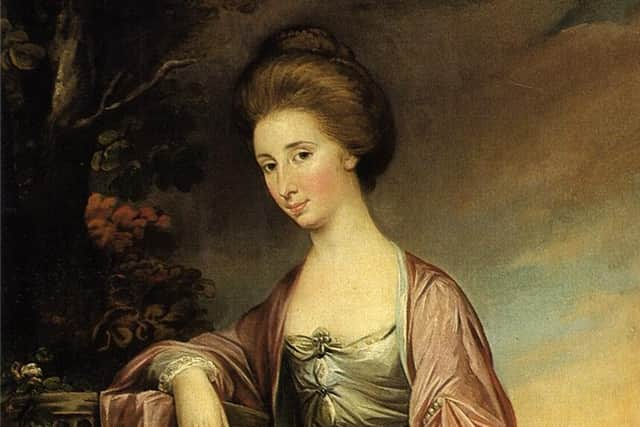CSI Adultery: 18th century divorce cases were forensic in their attention to detail when it came to sex – Susan Morrison
To paraphrase Father Ted, divorce for the Scots in the 18th century was not an ecumenical matter. It was a matter for the courts and it needed evidence, particularly if the parties were the great and good, and especially when charges of sexual irregularities were being thrown around.
It was CSI Adultery with the level of detail the investigators sought from the witnesses was positively forensic. In some cases, they could pinpoint the very moment the deed was done.
Advertisement
Hide AdAdvertisement
Hide AdTake the case of Elizabeth Rannie, first wife to the ambitious Henry Dundas, who became 1st Viscount Melville. She fell in love with another man, Captain Everard Fawkener of the 11th Dragoons. There was a ball in Musselburgh, and Elizabeth decided to attend. She planned to stay the night with friends. On the day of the bash, the dashing captain appeared at the house, and in a remarkably forward action, asked if he could essentially sofa surf.
Nice house, said he, care to show me around? The daughters of the house were suspicious. In their later statements, they said: “Bless me mama that officer expressed great curiosity to see all the rooms up stairs… and he asked who was to sleep in each of them!”
The family alert levels were hitting DefCon 2. Why the interest in the sleeping arrangements? Well, Mademoiselle Pasque, who lived with Mr Colt’s family, figured she knew the score. She claimed that “having taken an alarm”, she and some other guests kept a watch in the room opposite Elizabeth’s. At “a little after two in the morning”, she said she “saw the above officer in his night gown and slippers with a candle in his hand go into Elizabeth’s room”.
The house went into silent panic mode. The lady of the house was awakened. Everyone piled into her room – chambermaids, companions and daughters crammed in, whilst the captain and the lady were becoming better acquainted across the hall. Mrs Nicol, the cook, gave a statement that she saw Fawkener at 5.30am and “addressing herself to the officer by name”, she said, “Is it you captain? I am sure you was to have slept below stairs” – to which he “made no answer but went into his bed chamber”.
There’s an element of ‘Carry on Captain’ farce about all of this, if the final outcome for Elizabeth wasn't so tragic. No one got a good night's sleep. Everyone was spying by candlelight on the illicit lovers. No wonder Elizabeth complained that the house was noisy, and not helped by the cook snapping at the bold captain to get back downstairs.


Bet breakfast at Inveresk Lodge was a quiet affair that day. Elizabeth knew the gig was up. She fled back to Edinburgh and wrote a heartrending letter to the husband she had married when she was only 15, confessing her fall from grace and begging him to forgive her.
Of course, he didn't. Henry Dundas didn’t get to the top of British politics and that great big column in Edinburgh’s St Andrew Square by being the forgiving sort. The evidence of the night's shenanigans was carefully collected, and Elizabeth was divorced in five weeks. She lost her money, and her home, Melville Castle. She never saw her four children again. She died poverty-stricken in 1847, at the age of 97. Her son hadn’t even known she was alive.
Not all women suffered loss at the hands of the court system, as Lady Barbara Wauchope found. The depositions of her divorce make it clear that her other half, Sir George Seaton, was a long way away from Husband of the Year.
Advertisement
Hide AdAdvertisement
Hide AdNew Year's Day is traditionally a quiet time in Scotland, particularly in 1705. But not in the house of James Duncan. That morning, Kirk elders raided the room where they believed that Sir George was up to no good.
They thundered past the landlady who was valiantly attempting to block the door and, in the bedroom, they found the said “defender (Sir George) and the said Anna Cheisly… in the chamber alone together… Anna lying in naked bed and that there was but one bed in the room and they did see Sir George Seaton, defender, standing naked at the back of the said bed, nothing upon him but his shirt and night cap”.
It’s not behaviour becoming to a gentleman, but then, Sir George had a track record of behaving badly, including dumping a pregnant girlfriend up a close whilst she was in labour. One respectable house booted him out because the landlady, Margaret Johnson, was horrified to discover that the good Sir George not only had Anna Chiesly, his regular galpal, with him, he’d brought a “lady” from Leith. Margaret was so “afraid of the said women staying with him all night and she went to the town guard for the captain”. In other words, she called in the rozzers to stop a threesome.
Adam Shaw, Sir George’s servant, gave evidence that “in 1703 Sir George and Anna went to Cornwall for a month by horse”. The holiday was slightly ruined when “Sir George and Anna got caught”. Anna wound up in the Correction House in Berwick, until George sprung for her release.
Lady Barbara had had enough and was willing to go through the humiliation of a trial to get that man out of her wig. Sir George came up with a brilliant if unorthodox way to stop the divorce. His wife, he said, couldn’t divorce him. She was a Catholic. Nice try, but not even Scotland’s Presbyterian judges bought that.
George was binned, and Babs kept the lot – the money, the house and the titles. And thanks to that, through investigation of his crimes, misdemeanours and adultery, we know that she was well shot of him.
